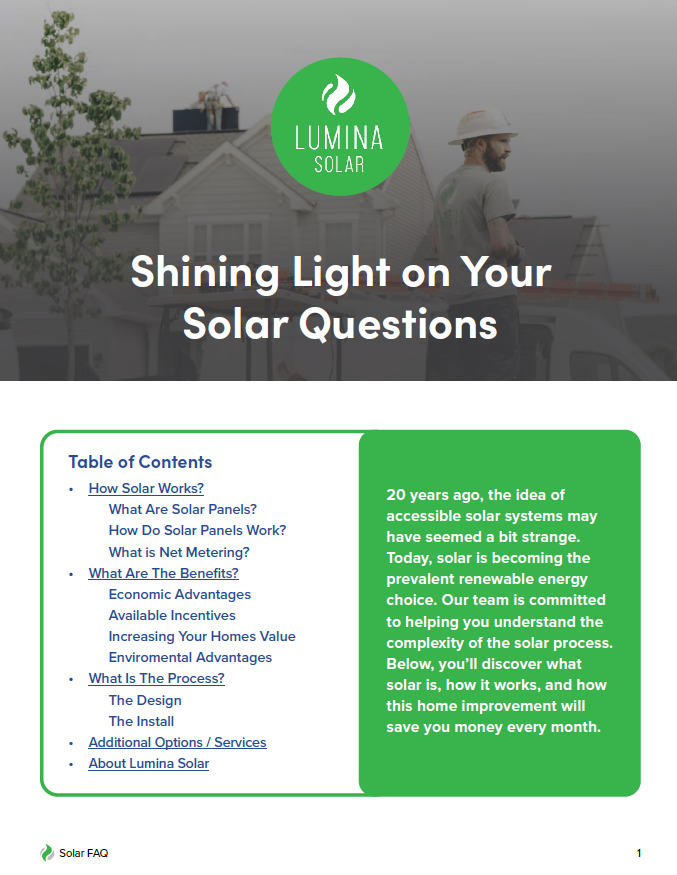Ground Mounted Vs Roof Mounted Solar Panels: Comparing solar panel installations on the ground versus on rooftops in Virginia
Ground-mounted solar panels and roof-mounted solar panels are two common types of solar panel installations. Ground-mounted solar panels refer to solar panels that are installed on the ground, typically in open spaces or large properties. On the other hand, roof-mounted solar panels are installed on the roofs of buildings, utilizing the available space.
The Benefits of Solar Energy Systems
Solar energy systems offer numerous benefits for residential and commercial properties. Here are some key advantages:
- Renewable Energy Solution: Solar energy systems harness the power of the sun, which is a renewable and sustainable source of energy.
- Cost Savings: By installing solar panels, property owners can reduce their electricity bills and potentially even sell excess energy back to the grid.
- Environmental Impact: Solar energy is clean and produces no greenhouse gas emissions, contributing to a healthier environment.
- Energy Independence: Generating your own electricity with solar panels provides independence from traditional energy sources and their associated costs.
- Long-Term Investment: Solar panels have a long lifespan and can provide a return on investment over time.
Overall, investing in solar energy systems, whether ground-mounted or roof-mounted, can lead to significant energy savings, environmental benefits, and increased energy independence.
Lumina Solar 8280 Willow Oaks Corporate Dr Suite 600, Fairfax, VA 22031, United States +18009716118
For more information – Click Here
Comparing Roof Mounted and Ground Mounted Solar Panels
When it comes to harnessing the power of solar energy, there are various options available, including photovoltaic (PV) panels for residential and commercial use. In this article, we will focus on the advantages of roof-mounted solar panels, an increasingly popular choice for many homeowners and businesses.
1. Space Efficiency
Residential and commercial buildings often have limited ground space, making rooftop installations an ideal solution. By utilizing the available roof area, you can maximize solar panel installation capacity without sacrificing valuable space on the ground.
2. Improved Solar Panel Efficiency
Rooftop installations offer improved solar panel efficiency due to their tilt and orientation, optimizing exposure to sunlight throughout the day. This leads to higher energy production and better overall performance of the solar power system.
3. Cost Savings
Roof-mounted solar panels can significantly reduce energy costs for homeowners and businesses by utilizing an existing structure to place the panels instead of using a newly built ground-mounted structure. By generating clean and renewable electricity, you can decrease reliance on traditional power sources and potentially lower monthly utility bills.
4. Aesthetically Pleasing
Roof-mounted solar panels are often considered more visually appealing compared to ground-mounted alternatives. They seamlessly integrate with the existing structure and can even enhance the overall appearance of the building.
As experts in the solar industry, Lumina Solar understands the numerous benefits that roof-mounted solar panels bring to both residential and commercial properties. By harnessing solar power generation, improving efficiency, and reducing energy costs, these installations provide a sustainable and eco-friendly solution for your energy needs.
Factors to Consider when Choosing Solar Panel Placement
When it comes to harnessing solar energy, choosing between ground-mounted and roof-mounted solar panels is an important decision. At Lumina Solar, we understand the various factors that can influence this choice and provide expert guidance to help you make an informed decision.
Solar Panel Size
The size of the solar panels you choose will play a crucial role in determining whether ground-mounted or roof-mounted placement is more suitable. Ground-mounted systems typically have more space available, allowing for larger panels and potentially higher energy production.
Solar Panel Placement
The placement of solar panels is another important consideration. Roof-mounted panels are a popular choice due to their ability to utilize existing space without occupying additional land. On the other hand, ground-mounted panels can be strategically positioned to maximize solar exposure and minimize shading.
Solar Panel Orientation
The orientation of solar panels affects their efficiency. Roof-mounted panels often match the angle of the roof which depending on their orientation and angle may help or hamper sunlight absorption. An experienced solar consultant will help put together a design that maximizes energy production of the panels for your unique roof and site specifications. An advantage of ground-mounted panels is they can be adjusted to face true south, ensuring maximum exposure to sunlight throughout the day.
Solar Panel Tilt
The tilt of solar panels also impacts their performance. Roof-mounted panels are typically installed at a fixed tilt angle, which may not be ideal for capturing the maximum amount of sunlight throughout the year. Ground-mounted panels can be adjusted seasonally to optimize tilt angles and enhance energy production.
Considerations for Installing Solar Panels
At Lumina Solar, we understand the importance of making informed decisions when it comes to solar panel installations. Whether you are considering ground-mounted or roof-mounted solar panels, there are several key factors to consider:
- Location: Assess the available space on your property and determine the best location for solar panel installation.
- Solar Panel Racking: Proper racking is essential for mounting the solar panels securely and maximizing their efficiency.
- Solar Panel Mounting: Choose the appropriate method for mounting the panels, considering factors such as tilt angle and orientation.
- Solar Panel Wiring: Ensure that the wiring is done correctly to optimize the performance and safety of your solar system.
- Solar Panel Inverters: Select reliable and efficient inverters that convert the DC power generated by the panels into usable AC power.
- Grid-Tied Solar Systems: Connect your solar panels to the grid to take advantage of net metering and potential cost savings.
By carefully considering these installation considerations, you can make the most of your solar panel system and enjoy the benefits of clean, renewable energy.
Installation Considerations for Solar Panels on Different Surfaces
When it comes to harnessing the power of solar energy, there are various installation considerations to keep in mind. In this article, we will focus on the installation of solar panels on different surfaces, specifically roof-mounted systems.
Rooftop Installation
Roof-mounted solar panels, such as off-grid solar systems, offer numerous advantages for homeowners. They allow for maximum utilization of available space and provide net metering capabilities, ensuring efficient energy production. Additionally, rooftop installations offer environmental benefits, reducing carbon emissions and reliance on non-renewable energy sources.
Considerations for Roof-Mounted Solar Panels
1. Solar Panel Cost: The initial investment in solar panels should be carefully evaluated, considering both the upfront expenses and the long-term return on investment (ROI) for solar panels.
2. Structural Integrity: Roof-mounted installations require a sturdy roof capable of supporting the additional weight of solar panels. A professional assessment of the roof’s condition and load-bearing capacity is crucial.
3. Orientation and Angle: The optimal positioning of solar panels is essential for maximizing energy production. South-facing roofs with a tilt angle that aligns with the geographical latitude tend to yield the best results.
Key Benefits of Roof-Mounted Solar Panels
- Utilization of available roof space
- Net metering capabilities for efficient energy usage
- Reduced carbon emissions and environmental impact
In conclusion, the installation of roof-mounted solar panels offers numerous advantages. By considering factors such as solar panel cost, structural integrity, and optimal positioning, homeowners can make informed decisions regarding their solar energy investment. Embracing solar power not only benefits the environment but also provides long-term financial returns.
Comparing the Costs: Solar Panels for Ground and Roof Mounting
As experts in solar panel installations, Lumina Solar understands the importance of making informed decisions when it comes to investing in renewable energy. In this section, we will discuss the cost comparison between ground-mounted and roof-mounted solar panels, providing insights to help those new to solar make the right choice.
Energy Savings with Solar Panels: Solar panels are an excellent way to reduce your energy bills and save money in the long run. Both ground-mounted and roof-mounted panels can generate significant energy savings, depending on various factors such as the available sunlight and system size.
Solar Panel Lifespan: Solar panels are designed to be durable and long-lasting. Typically, they come with warranties that can range from 20 to 25 years. Regular maintenance, such as cleaning and inspection, can help maximize the lifespan of your panels.
Solar Panel Maintenance: Proper maintenance is essential to ensure optimal performance and longevity of solar panels. While ground-mounted panels may require more frequent cleaning due to potential dirt accumulation, roof-mounted panels may benefit from reduced exposure to debris.
To summarize, both ground-mounted and roof-mounted solar panels offer energy savings, come with warranties and have a long lifespan. However, the suitability of each option depends on several factors, including available space, sunlight exposure, and potential obstacles. At Lumina Solar, we are here to assist you in making the best decision for your specific needs and maximize the benefits of solar energy.
Comparing Solar Panel Mounting Options
When it comes to the aesthetics and design of solar panels, one crucial decision is whether to install them on the ground or on the roof. As experts in solar panel technology, we at Lumina Solar in Virginia understand the importance of this choice and can provide valuable insights to help you make an informed decision.
Ground Mounted Solar Panels
- Solar panel degradation: Ground-mounted panels are less prone to degradation due to improved airflow and easier maintenance access.
- Solar panel shading: Proper positioning of ground-mounted panels minimizes shading concerns, ensuring maximum sunlight absorption.
- Solar panel snow removal: Ground-mounted panels are easier to clear of snow, ensuring optimal energy production during winter months.
- Solar panel financing options: Various financing options are available for ground-mounted installations, making them more accessible to homeowners and businesses.
Rooftop Solar Panels
- Solar panel shading: Shading concerns can arise with rooftop panels, especially if there are nearby trees or structures blocking sunlight.
- Solar panel snow removal: Removing snow from rooftop panels can be more challenging and may require professional assistance.
- Solar panel monitoring: Monitoring rooftop panels may involve additional complexities, depending on the accessibility of the installation.
- Solar panel financing options: Multiple financing options for rooftop installations are available
By evaluating these factors, you can choose the mounting option that best suits your preferences and requirements. Whether you opt for ground-mounted or rooftop solar panels, Lumina Solar is here to guide you through the process and help you achieve a sustainable, efficient, and visually appealing solar energy system.
Variations in Solar Panel Installation: Maximizing Energy Output
When it comes to solar panel installations, there are various factors to consider in order to maximize energy output. At Lumina Solar, we have extensive knowledge and experience in this field, providing expert guidance to newbies. Here are some key aspects to be aware of that Lumina Solar handles:
- Solar Panel Rebates: Take advantage of available rebates that can significantly reduce the initial cost of your installation.
- Solar Tax Credits: Explore the tax credits provided by the government to further offset the expenses of going solar.
- Solar Panel Installation Permits: Familiarize yourself with the necessary permits required for a smooth installation process.
- Solar Panel Regulations: Understand the regulations and guidelines set by local authorities to ensure compliance.
- Solar Panel Sustainability: Embrace the long-term benefits of solar energy, contributing to a greener and more sustainable future.
By considering these factors, you can make informed decisions regarding your solar panel installation, ultimately maximizing energy output and reaping the rewards of clean, renewable energy.


